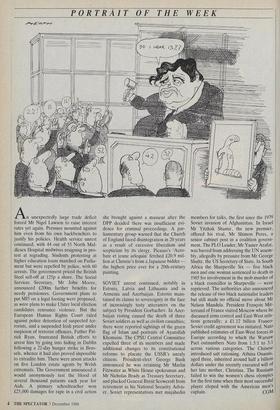PORTRAIT OF THE WEEK
An unexpectedly large trade deficit forced Mr Nigel Lawson to raise interest rates yet ,again. Pressure mounted against him even from his own backbenchers to justify his policies. Health service unrest continued, with 44 out of 55 North Mid- dlesex Hospital midwives resigning in pro- test at regrading. Students protesting at higher education loans marched on Parlia- ment but were repelled by police, with 60 arrests. The government priced the British Steel sell-off at 125p a share. The Social Services Secretary, Mr John Moore, announced £200m further benefits for needy . pensioners. Government plans to put MI5 on a legal footing were proposed, as were plans to make Ulster local election candidates renounce violence. But the European Human Rights Court ruled against police detention of suspected ter- rorists, and a suspended Irish priest under suspicion of terrorist offences, Father Pat- rick Ryan, frustrated British efforts to arrest him by going into hiding in Dublin following a 22-day hunger strike in Brus- sels, whence it had also proved impossible to extradite him. There were arson attacks on five London estate agents by Welsh extremists. The Government announced it would anonymously test the blood of several thousand patients each year for Aids. A primary schoolteacher won £25,000 damages for rape in a civil action
she brought against a masseur after the DPP decided there was insufficient evi- dence for criminal proceedings. A par- liamentary group warned that the Church of England faced disintegration in 20 years as a result of excessive liberalism and scepticism by its clergy. Picasso's `Acro- bate et jeune arlequin' fetched £20.9 mil- lion at Christie's from a Japanese bidder — the highest price ever for a 20th-century painting.
SOVIET unrest continued, notably in Estonia, Latvia and Lithuania and in Armenia and Azerbaijan. Estonia main- tained its claims to sovereignty in the face of increasingly testy utterances on the subject by President Gorbachev. In Azer- baijan rioting caused the death of three Soviet soldiers as well as civilian casualties; there were reported sightings of the green flag of Islam and portraits of Ayatollah Khomeini. The CPSU Central Committee expelled three of its members and made additional changes to its constitutional reforms to placate the USSR's unruly citizens. President-elect George Bush announced he was retaining Mr Marlin Fitzwater as White House spokesman and Mr Nicholas Brady as Treasury Secretary, and plucked General Brent Scowcroft from retirement as his National Security Advis- er. Soviet representatives met mujahedin
members for talks, the first since the 1979 Soviet invasion of Afghanistan. In Israel Mr Yitzhak Shamir, the new premier, offered his rival, Mr Shimon Peres, a senior cabinet post in a coalition govern- ment. The PLO Leader, Mr Yasser Arafat, was barred from addressing the UN assem- bly, allegedly by pressure from Mr George Shultz, the US Secretary of State. In South Africa the Sharpeville Six — five black men and one woman sentenced to death in 1985 for involvement in the mob murder of a black councillor in Sharpeville — were reprieved. The authorities also announced the release of two black nationalist leaders but still made no official move about Mr Nelson Mandela. President Francois Mit- terrand of France visited Moscow where he discussed arms control and East-West rela- tions generally; a £1.12 billion Franco- Soviet credit agreement was initiated. Nato published estimates of East-West forces in Europe according to which the Warsaw Pact outnumbers Nato from 1.5:1 to 3:1 across various categories. The Chinese introduced salt rationing. Athina Onassis, aged three, inherited around half a billion dollars under the recently executed will of her late mother, Christina. The Russians failed to win the women's chess Olympics for the first time when their most successful player eloped with the American men's


































































 Previous page
Previous page